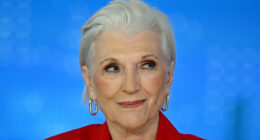
This clip made for good drama from today’s January 6 hearing but there was a point to it beyond simply relishing the spectacle of lawyers who were still tethered to reality duking it out with the likes of Sidney Powell and Rudy Giuliani.
The December meeting came about because Bill Barr wouldn’t act on Trump’s request/order to seize voting machines in hopes of proving that they’d been tampered with to guarantee Biden’s victory. There’s no probable cause to believe a crime was committed, Barr told him, so there’s no grounds to do it. Enter Team Crazy: Powell, Giuliani, and Mike Flynn, who were whisked into the Oval Office on December 18, 2020 to share their theories with Trump of a far-reaching plot to rig the election in Biden’s favor.
Imagine being Pat Cipollone, Trump’s White House counsel, and getting a phone call that those three were meeting alone with the president at that hour, trying to persuade him to stoop to all manner of banana-republic lunacy to undo his defeat.
We no longer have to imagine it. Watch this reel produced by the committee of all the major players that day recounting the meeting in their own words. Except Flynn, that is, who once publicly called for “limited martial law” to facilitate re-running the election. He took the Fifth.
On Dec 18, 2020, Sidney Powell, Lt. Gen. Flynn, and others entered the White House for a meeting.
The meeting lasted multiple hours and included two groups of Trump advisers trading insults, accusations of disloyalty to the president, and even challenges to physically fight. pic.twitter.com/azqHAENbmB
— January 6th Committee (@January6thCmte) July 12, 2022
What’s the point of going through all of that at today’s hearing? Simple: The committee continues to work to establish that Trump had every reason to know there was no evidence that the election was rigged. Barr told him, then his own guys — Cipollone and Eric Herschmann — challenged the evidence right in front of him. In his introductory remarks, Jamie Raskin called the meeting “critically important because President Trump got to watch up close for several hours as his White House counsel and other White House lawyers destroyed the baseless factual claims and ridiculous legal arguments offered by Sidney Powell, Mike Flynn and others.”
Other evidence was produced today to show that those around Trump were — allegedly — urging him to concede:
Driving the news: Former White House Counsel Pat Cipollone testified that former White House Chief of Staff Mark Meadows indicated around late November and after that Trump would eventually leave office gracefully in discussions about him conceding the election.
“I would say that that is a statement and a sentiment that I heard from Mark Meadows … it wasn’t a one time statement,” Cipollone said in closed-door testimony before the committee last week.
Former Attorney Bill Barr testified that, around that time, Trump’s son-in-law and senior adviser Jared Kushner said he and Meadows were “working on” getting Trump to accept the reality.
Former Labor Secretary Eugene Scalia testified that in mid-December, he “communicated to the president … what had to be done was concede.”
Other staffers like Kayleigh McEnany and even Ivanka Trump said they assumed the end of litigation in court meant the end of Trump’s chances of overturning the election. If he couldn’t prove fraud to a judge, he had no grounds to remain in power.
The relevance of him being told again and again and again by trusted advisors that he’d lost and it was time to say so is that all of the relevant federal crimes of which he might be convicted for his “rigged election” shenanigans require proof of specific intent. If he sincerely believed that the election was rigged then he lacked that intent; only if he knew the truth, or had reason to know, and deceived the public about it anyway would he be guilty of a crime like defrauding the United States.
That was the point of today’s hearing, to show that Trump had reason to know from the counsel he was getting from trusted advisors that there had been no “steal.” Liz Cheney tipped the committee’s hand in her introduction, stressing that Trump is a grown man and therefore as responsible as anyone else is for using good judgment in weighing the information he receives. The fact that he continued to press on despite the warnings from Barr, Cipollone, and Herschmann that there was no evidence of rigging amounts to “willful blindness,” a legal term of art that Cheney pointedly used in her comments. A defendant who insists on remaining willfully blind to the truth can’t claim that he lacked specific intent to commit a crime. His intent was “pure” only because he doggedly refused to listen to reason.
“President Trump is a 76-year-old man. He is not an impressionable child.” Rep. Liz Cheney says during the Jan. 6 committee hearing that Trump cannot evade responsibility by being willfully blind. More live video: https://t.co/3viCTE2FV7 pic.twitter.com/i9rgRf5Vic
— NBC Bay Area (@nbcbayarea) July 12, 2022
There’s a running debate among anti-Trumpers over whether it was good or bad in the long run for respectable figures like Cipollone and Herschmann to have worked for Trump. Most believe it was a good thing; sane folk were needed to counter the influence of the less sane ones. But some, like Tim Miller of the Bulwark, argue otherwise. Shouldn’t Americans have gotten the president they signed up for, he’s asked? Maybe if Trump had gone fully crazy and made Sidney Powell special counsel for election fraud or whatever, he would have steered the country so far off the rails that Senate Republicans would have removed him in his eventual impeachment trial after all. Then we’d be done with him.
I’m in the first camp and today’s hearing shows why. With Powell and Rudy steering the ship, there’s no way of knowing how horrendous things might have gotten. Remember that some of Trump’s nuttier confidants wanted him to invoke the Insurrection Act and to use the military to seize voting machines. Gangs like the Oath Keepers and Proud Boys were standing by in case Trump issued any orders to move against political enemies. There’s no good reason to believe that cowardly Senate Republicans would have found their balls and removed Trump from office if his bid to hold on to power, however ruthlessly, suddenly began to look like it might bear fruit. I understand Miller’s disdain for the cronies like Cipollone who justified their willingness to work in the White House with self-serving rationales about being the “adult in the room,” but without those adults around, things might have gotten much darker than they did. Remember the pessimist’s credo: It can always get worse. And probably will.
Source:






